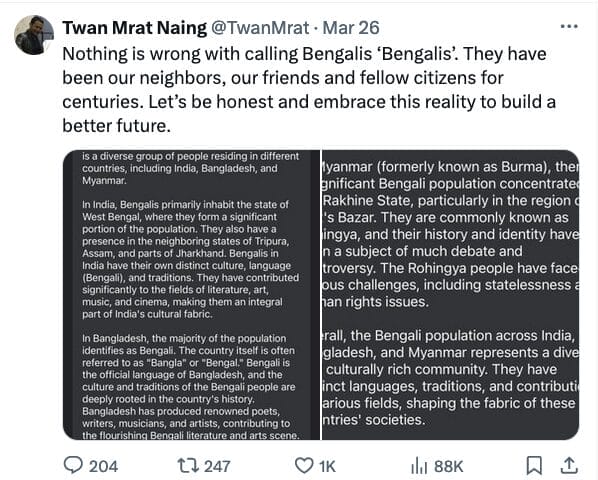On 26 March with his 31-words tweet on X (formerly Twitter), the leader of the Arakan Army Twan Mrat Naing gave away the genocidal character of the increasingly powerful armed Rakhine nationalist movement.
It was accompanied by two pictures of the pages about the poorly distorted description of “Bengali”. The AA leader did not offer where the pages were lifted from. The text said:
“Nothing is wrong with calling Bengalis “Bengalis”. They have been our neighbours, our friends and fellow citizens for centuries. Let’s be honest and embrace this reality to build a better future”.
The two pages the Arakan Army leader took pictures of, and presented as “evidence” that Rohingyas are nothing but Bengali have zero historical or intellectual value. As is typical of peoples along post-independent borders of newly birthed nation-states anywhere in the world, Rohingyas do have bi-national or bi-cultural ties to both West and East Bengal (now India and Bangladesh) and the Rakhine region of present day Myanmar. But they are, and identify themselves, as distinct from Bengalis of either India or Bangladesh (formerly East Pakistan). Neither state nor non-state organization such as the Arakan Army has any moral power or legal right to pigeonhole Rohingyas into the frozen box of “Bengali”. To do so is empirically false, shows an acute lack of understanding of ethnic group identity formation, and an utter breach of internationally recognized minorities’ right to self-identify.
His tweet followed his organization’s statement inviting foreign investors to Rakhine, increasingly under the AA control.
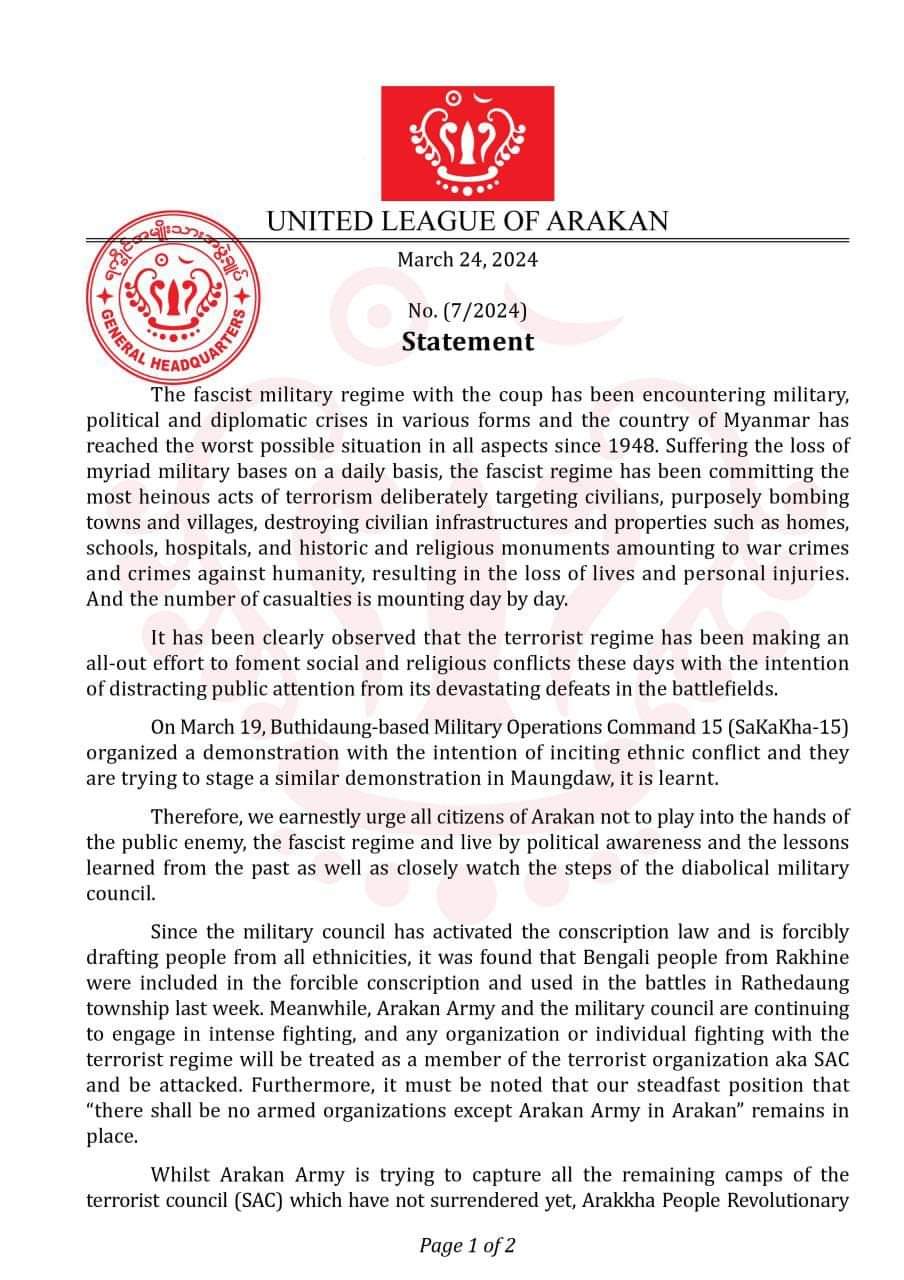
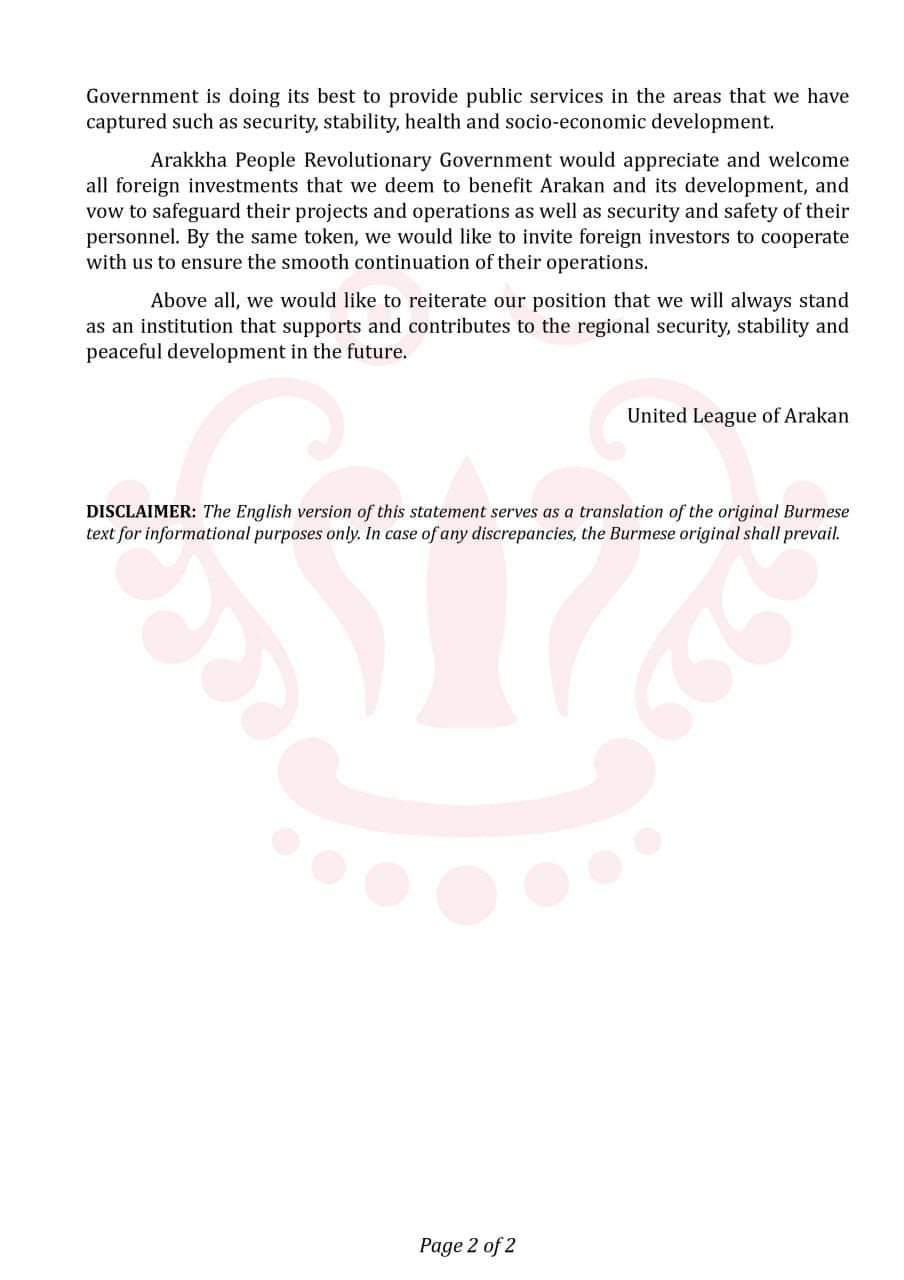
As a matter of fact, the Rakhine nationalist is oblivious to the fact that “Bengali” is the constitutional name of the citizens of the Republic of Bangladesh birthed in the civil war between East and West Pakistan in 1971.
It encompasses any citizen irrespective of their faith, ancestral or ethnic background, including Rakhine Buddhists with their root going back to the British time during which Bangladesh was a British protectorate of East Bengal. In fact, when I led a small delegation of international lawyers, genocide scholars and rights activists including Rohingya we met a Bangladeshi assistant to the Speaker of the House, Dr Shirim Sharmin Chaudury, who was a Rakhine Buddhist.
While the leadership of Bangladesh has advanced to the cultural and ideological space where they embrace as “Bengali” any citizen of their new republic, Rakhine nationalist leadership of Arakan Army and its political wing United League of Arakan evidently base their policies and collective outlook in the antiquated thinking which refuse to recognize Rohingyas for who they say they are: Rohingyas. Aside from the minorities’ rights to self-identify in the age of the Universal Declaration of Human Rights, Rohingyas are self-consciously and empirically not Bengali. Their Rohingya language is known have 60% overlap with the local Bengali language of Chittagong, and the majority of both Bengali and Rohingya share Islam as their faith; however, they certainly do not consider themselves as “Bengali”, ethnolinguistically or citizenship-wise.

Location of Rakhine State in Myanmar. Wikipedia Commons
Of all the ethnic groups of Myanmar, Rakhine nationalists and Rakhine public alike are best positioned to know that language affinity, shared religion and ever overlapping political histories do not make them Burmese. Burmese and Rakhine languages have so much overlap, in script and colloquialism. Buddhism is their common faith. Throughout the colonial period, ethnic Rakhine and Burmese forged a common oppositional identity against their common oppressor – the alien colonial British – under the single banner of Burmese. There have been so much Rakhine-Burmese interracial marriages and internal migration since Rakhine was annexed into the ethnic Burmese-dominated old political system since 1785. After independence, Rakhine nationalists re-established their ancestral identity as Rakhine and pushed for “internal sovereignty” and state autonomy.
In seeking to understand why the Rakhine nationalist leader’s tweet – and the AA’s invitation to foreign investors – is fundamentally genocidal in character, a word about the rich conception of genocide is necessary.
A chilling parallel between the way the Zionists construct their group identity, initially as “Palestinians”. A best-known case in point: the late Prime Minister Golda Meia, a Tsarist Kiev-born Ukrainian Jew who migrated first to Milwaukee, Wisconsin (USA) and subsequently and eventually to the British Protectorate of Palestine in the early 1920s, never tired of claiming herself “Palestinian”, while dismissing and denying that native Arabs were Palestinians. In her communications with the Burmese governments (both U Nu’s and General Ne Win’s), she had urged them how to vote on any UN resolution on Palestine while telling the latter not to call Palestinians Palestinians. On the streets of Israel over the last decade, the chilling echoes of Golda Mei’s racism towards the natives of Palestine can still be heard, in the settlers’ popular chant – “Death to the Arabs”.
Likewise, Myanmar’s Aung San Suu Kyi, the leader of the semi-democratic and popular government, had officially, and infamously, urged the United Nations agencies and other foreign diplomatic missions in Yangon “not to use the term ‘Rohingya’”. When I shared the Rule of Law Roundtable at the London School of Economics on 18 June 2012, Aung San Suu Kyi chose not to say a word about Myanmar military’s violence against Rohingya people. Because she wanted to keep her mouth shut on this emerging policy crisis I was pre-assigned by the panel chair Professor Mary Kaldor to handle any question from the audience regarding the violence against Rohingya people.
Again, in December 2019, Phillipe Sands, the renown British Jewish lawyer who represented Gambia in the African state’s case against Myanmar at the ICJ, pointedly called Aung San Suu Kyi out for her refusal to even mention the name Rohingya when she made her opening and closing statements defending Myanmar military against the allegations of genocide and denying that such crime was committed. Sands is the world’s leading scholar of Raphael Lemkin’s life and work, and he must have appreciated the multiple ways in which genocidal perpetrators seek to destroy their victim groups, not only physically but also culturally and symbolically.
Public understanding of genocide – the intentional destruction of a human group, or population, rests on the legal text of the Genocide Convention of 1948. Emphatically, the legal definition of genocide was a severely watered down version of the originally multi-layered and multi-faceted conception of genocide.
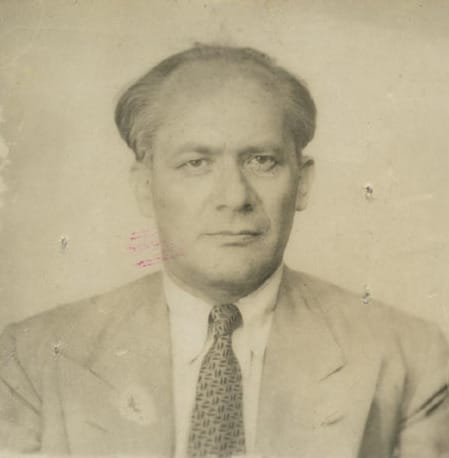
Raphael Lemkin (Polish: Rafał Lemkin; 24 June 1900 – 28 August 1959) was a Polish lawyer of Jewish descent who is known for coining the term genocide and campaigning to establish the Genocide Convention. Wikipedia
As a brief detour, Raphael Lemkin, the Polish Jewish refugee and a lifelong legal scholar activist, first introduced his concept “genocide” at Nuremberg Trials in 1945, which was mentioned once, and largely ignored throughout the trials. He was a legal assistant to the US legal team at the trials of the senior Nazis including Air Marshall Hermann von Goering.
In Lemkin’s original conception of “genocide”, a process of the intentionally destroying “nations under occupation,” has two main phases: one is the phase of “the (physical) destruction of the national pattern of the oppressed group” (typically a targeted, unwanted vulnerable minority group), and the other, “the imposition of the national pattern of the (genocidally successful) oppressor. (p. 79).” (“Genocide, Chapter IX, I. Genocide – A New Term and New Conception for Destruction of Nations,” In Raphael Lemkin, Axis Rule in Occupied Europe: Laws of Occupation, Analysis of Government, Proposals for Redress, Second Edition by the Law Book Exchange, Ltd., 2008, originally published in 1944).
Lemkin would certainly concur that the group identity – the name – is a crucial pillar of his conception of “the national pattern” which the (genocidal) oppressor seeks to impose on those who survive the Phase One, that is, physical destruction. In other words, the survivor population will be allowed to live only under the group name which the triumphant genocidal oppressor chose.
Again, a chilling parallel between Israel’s ongoing genocidal destruction of Gaza’s Palestinians and Myanmar’s genocidal process to which Rohingya as a group has remained subjected to, goes beyond the hysterical rally cry “Death to the Arabs”.
In his 29th March commentary on Israel’s attempt to severely restrict emergency aid to the besieged population of Palestinians in Gaza, James M. Dorsey, the Middle East specialist who is an Adjunct Senior Fellow at Nanyang Technological University’s S. Rajaratnam School of International Studies, calls attention to one major reason as to why Israel opposes the continuing existence of UNRWA (the UN-mandated aid agency created in 1949) in the Occupied Territories: Israel views UNRWA as “contribut(ing) to Palestinians’ national identity.”
Both genocidal states of Myanmar and Israel, founded in the same year, and once had “a love affair”, to borrow Golda Meir’s own characterisation of military, ideological and technical ties (see My Life: Golda Meir, The Orion Books, 2023) ended up before the United Nations’ highest court – the International Court of Justice (ICJ) for their all-too-obvious respective breaches of the Genocide Convention.
Noteworthy here is the ICJ has officially declared both victim populations, Rohingya and Palestinians, as “protected groups” under the convention, addressing them as Rohingyas and Palestinians, despite respective perpetrating states’ attempts to deny, erase and destroy the victim groups’ identities.
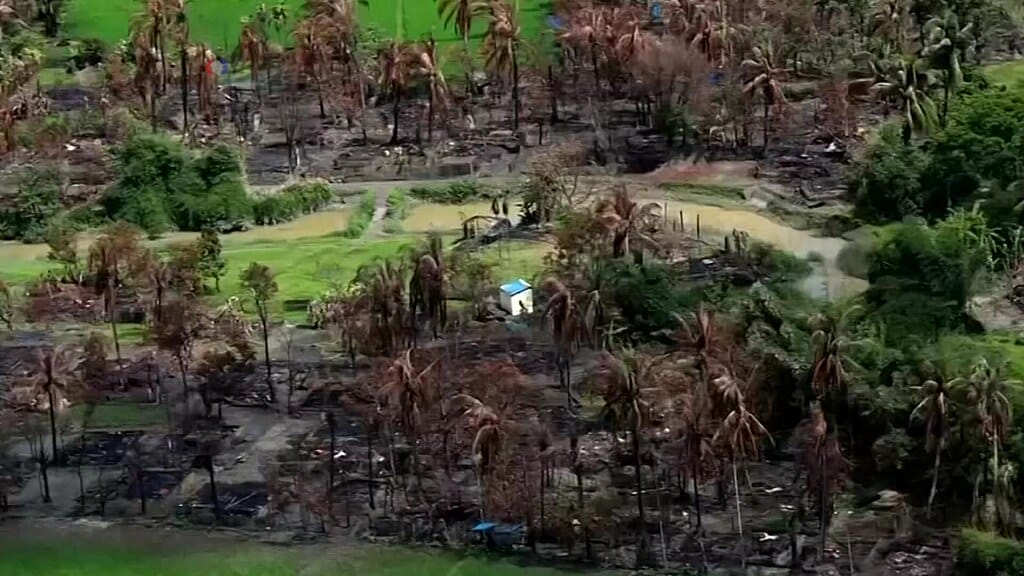
Aerial view of a burned Rohingya village in Rakhine state, Myanmar – September 2017. Wikipedia Commons
Against this conceptual and legal backdrop, the official tweets and policy statements issued by the Arakan Army/United League of Arakan leadership where the un-concealed, and dogged, attempts at group identity destruction of Rohingya ought to be taken seriously – as an integral to the on-going genocidal process, from which Rohingyas have continued to flee, taking life risking sea journeys across the Adaman and South China seas.
Importantly, a silver lining for the Rohingya is the majoritarian public opinion has shifted for better. Many ethnic Bama activists, including revolutionaries in exile in Thailand have screamed foul of the Rakhine nationalists for continuing to hold on – and express publicly – to the genocidal views towards Rohingya people. In a 180-degree reversal of their policy, even Myanmar’s genocidal military leadership are now resorting to forcibly conscripting young Rohingya men into the junta military, promising full citizenship, and shadow-organizing Rohingya “anti-war” mass protests in the predominantly Rohingya neighbourhoods in Rakhine state. No doubt the junta’s latest moves are sinister in that it seeks to replenish its lost troop strength in the face of a series of military defeats at the hands of the Rakhine nationalists, and to reignite the bilateral tensions between Rohingyas and Rakhine. After all Rakhine nationalists have consistently collaborated with the successive military regimes since General Ne Win’s era in the late 1970s, in the Myanmar military-orchestrated slow-burning genocide.
Finally, as a Burmese from the ethnic Burmese heartland of Myanmar, with 3-generations of tie to the genocidal national armed forces, and a scholar who has specialised in the study of genocides over the last 15 years, I take the continuing genocidal treatment of Rohingya people personally. I knew some of the architects and key players of my birth country’s triangular genocide.
My late great-uncle was the deputy commander of what was then known as All Rakhine Command headquartered in Sittwe, the capital of Rakhine State, Western Myanmar, in 1961-63. Besides the minorities’ internal legal right to self-identify, the authenticity of the Rohingya group identity is beyond dispute, if one is to base one’s assessment on primary historical records, official documentation by Myanmar governments and oral histories. As a matter of fact, I keep on my blog the type-written thank-you letter my relative, Major Ant Kywe, signed on behalf of his commander Lt-Colonel Ye Gaung, and sent to all the Rohingya community leaders, teachers, and other civil servants who assisted him in successfully holding the surrender ceremony of the armed “insurgents” known as Mujahideens, from the ranks of Rohingya in 1961.
The faculty adviser of the Burmese Association at the University of California at Davis where I started my American schooling in the late 1980’s was a Rakhine American atmospheric scientist named Kyaw Tha Paw Oo, whose grandfather was the best-known Rakhine politician who introduced the idea of “internal sovereignty” for Rakhine state in the national parliament during the 1st decade of Myanmar’s independence.
As fellow exiles in the United States in the 1990’s, I was friends with the late Rakhine nationalist historian Aye Kyaw, who was a drafter of the country’s 1982 Citizenship Act, designed primarily to strip Rohingya people of their citizenship. The early Rakhine nationalists of Aye Gyaw’s generation pushed, without success, the Citizenship Act drafting committing, to make 1785, the year Rakhine lost their independent kingdom to the ethnic Burmese, the cut-off year for “natural/ancestral” citizenship.
Through my interactions and conversations with these pioneering nationalists and their descendants, I know the strength of Rakhine ethno-nationalism.
Twan Mrat Naing and the Arakan Army leadership have been militarily successful in their attempts to repel what they rightly consider the occupying Bama junta troops from their ancestral land. Though an ethnic Bama, I unequivocally support their quest for the end of Bama control their ancestral land, exploitation of their resources and the politically autonomous or even independent sovereignty.
The extreme racism that Rakhine nationalists have, over the generations, displayed – their sense of racial and religious superiority vis-à-vis Rakhine state’s largest minority population of Rohingya, largely Muslims, their dogged attempts to deny and destroy Rohingya identity – appears to be their Achilles’ heel.
In spite of the business-friendly tone and liberal tongued narrative, Rakhine nationalist leadership display the lack of adherence to any human rights and democratic principles. Absent principles and any ideals, they change their tunes depending on the situation on the ground. Here several years ago the same Twan Mrat Naing was heard calling Rohingya by their group name: https://www.facebook.com/rooinga/videos/1257747735182919/
Rakhine nationalist leaders now want foreign investment and international businesses to strike deals with their new revolutionary government (as opposed to Myanmar’s junta), and “vow to safeguard their projects and operations, as well as the security and safety of their personnel.” But they threaten to crush any “Bengali” who collaborate with the “terrorist” and “fascist” Myanmar military, in spite of the fact that Rohingyas are caught between the two genocidal forces – Rakhine nationalists and Myanmar genocidal military.
We live in an age where the world’s public opinion is increasingly and widely aware of the death and devastation caused by genocidal states, particularly Israel. It is decidedly against genocide. Owing to the Palestinian-led Boycott, Divestment and Sanctions (BDS) movement worldwide, many foreign investors are aware of severe business and reputational risks in doing business in situations of genocide. They would be unlikely to be keen on pouring investment into another troubled part of the world – in the region of Rakhine, which I call “triangle of death” or “a genocide triangle.”
Maung Zarni


